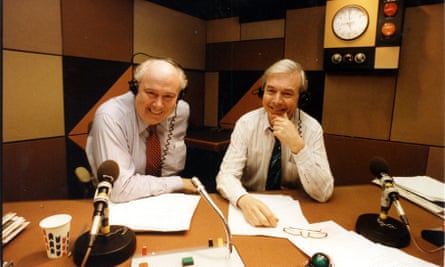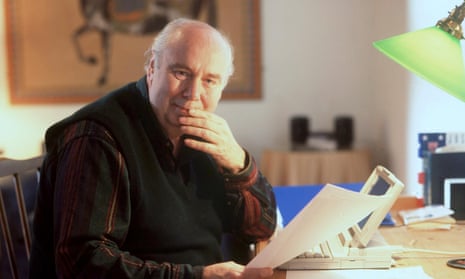For any contributor to Radio 4’s Today programme in the mid-1980s onwards, as I was occasionally, the sight of the well-upholstered, chubby-cheeked Peter Hobday smiling a welcome as he leaned over his script towards the microphone was reassuring. So was his warm voice and gentle humour for millions of listeners.
Hobday, who has died aged 82, was one of the roster of around five presenters for 14 years from 1982, brought in originally to help buttress the BBC radio programme just before breakfast television started the following year.
A polite embodiment of English rectitude, Hobday was popular among the mainly middle-class, middle-aged listeners, who appreciated his jokes, off-the-cuff references to the troublesome camellias in his Kensington garden, and the joshing by his colleagues related to his girth.
So the BBC’s dismissal of Hobday from the show in 1996 created upset among its fanbase, and headlines in the newspapers. The Times launched a Save Hobday campaign, but it was not to be. Hobday himself slipped away quietly after a final broadcast on a Saturday morning in March, with no mention of his departure, no party, no letter of thanks. “That’s the only bitterness I really feel,” he said afterwards.
His fellow presenter John Timpson, disgusted by his sacking, noted his good humour, unfailing charm and work ethic. “He was not part of the new knock’em down brigade. He was the last breath of sanity,” he said.

The decision not to renew Hobday’s contract had been taken by the newish Today editor Roger Mosey at the height of the director general John Birt’s era, as the programme sharpened up and introduced fresh talent such as James Naughtie and Anna Ford, with the more challenging existing presenter John Humphrys earmarked to become the voice of Today.
It had been a slow fade-out – Hobday had been rostered for only 50 programmes in the previous year. In the book All Our Todays, Forty Years of the Today Programme, the author and radio expert Paul Donovan wrote that Tony Hall, then head of news and current affairs, considered him to be the least of the show’s presenters, always the third man, while conceding he was a very good broadcaster and liked by listeners.
Hobday had first started working for the BBC in 1970 with stints on the World Service, which built to a role in launching Newsnight on BBC2 in 1980. Two years later he was selected by the then Today editor, Julian Holland, to replace Libby Purves. Hobday, who often co-presented with Sue MacGregor, described Holland as the last old-fashioned editor of the programme: “He bollocked us every day. We all loved him.”
Today then was headed by the partnership of talkative Brian Redhead, the often mischievous personality of the show until his death in 1993, and the avuncular Timpson, with Hobday and others in a supporting role.
After Holland retired in 1986, Jenny Abramsky took over: she noted that Hobday’s interviews could be sharper and that producers making the programme sometimes wished he made more of their preparatory work, but that listeners felt he represented them. She was succeeded by Phil Harding. The programme was already under attack for anti-Tory bias, notably Norman Tebbit taking a lead part, and Harding would flourish a stopwatch to counter accusations of bias during the 1987 election campaign.
Mosey took the helm in 1993. In 1995 the programme’s tone was criticised by a Social Market Foundation report, which accused Today of being too soft towards charities and lobbyists, and Mosey sought a tougher approach.
After his sacking, Hobday himself remarked that “a fat middle-aged hack like me didn’t really square with the lean mean interview machine”; his style tended towards apologising for interrupting. With his laid-back easy style and good humour, he may well have lacked star quality but was, as Humphrys said, “a good bloke to work with”.
Born in Dudley, in the West Midlands, Peter was the son of Arthur Hobday, a civil servant, and Dorothy (nee Lewis), a teacher. His elder brother, John, became an announcer at the BBC. Peter was educated at St Chad’s college, Wolverhampton, then studied modern languages at Leicester University, but did not collect a degree after a failed classics module compounded by playing too much bridge.
He did national service at the Nato headquarters in Paris, where he became bilingual, and also picked up Russian. He met and married his first wife, Tamara Batcharnikoff, in 1959. On his return he briefly worked on the Wolverhampton Chronicle, in public relations at GEC, and then on business magazines, before freelancing at the World Service.
His long career with BBC News and Current affairs also included The Financial World Tonight, from 1974, British radio’s first daily business programme, Money Box (1977-80), which drew on his strengths as a business journalist, and standing in for Robin Day on The World at One. On television, he presented The Money Programme for a year before Newsnight. After the Today programme he presented Radio 3’s Morning Collection, which became Masterworks, until 2000.
When he left the corporation he was not without lucrative offers. His main income switched to chairing conferences, and thanks to his fluent French he was in demand in Brussels and Paris too.
Tamara died in 1984 of cancer, which overshadowed his first years on Today. In 1996 he married Victoria Fenwick, and they divided their time between London and Italy after buying a farmhouse in Umbria, where he tended his olives, enjoyed la dolce vita and wrote a series of books including In the Valley of the Fireflies: an Englishman in Umbria (1995).
He is survived by Victoria, and his children from his marriage to Tamara, John and Natasha.

Comments (…)
Sign in or create your Guardian account to join the discussion